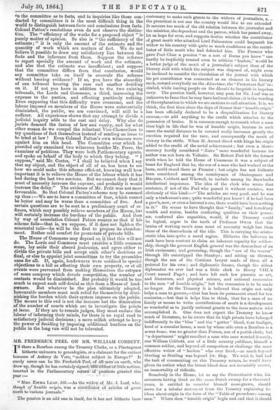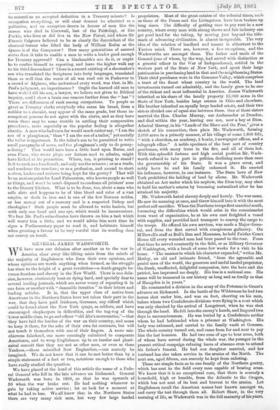MR. FREDERICK PEEL ON MR. WILLIAM COBBETT.
IB there a Bourbon among the Treasury Clerks, or a Plantagenet hitherto unknown to genealogists, or a claimant for the extinct honours of Aubrey de Vere, "noblest subject in Europe?" It surely never can be Mr. Frederick Peel, of all men'on earth, who drew up, though be has certainly signed, tlflitldestbf little notices, inserted in the Parliamentary return" of 'penhioiis granted this year :— " Mits. Emma LEAF, 501.—As the widow of Mr. J. Led, who, though of humble origin, was a centriimtor of articles of great merit to various journals."
The pension is an odd one in itself, for it has not hither to been customary to make such grants to the widows of journalists, a. the precedent is not one the country would like to see extended
It savours too much of the old relation between the journalist and the minister, the dependent and the patron, which has passed away, let us hope for ever, and suggests doubts whether the contributor
of great merit who attacked Lord Palmerston could bequeath his widow to his country with quite as much confidence as the contri- butor of little merit who had defended him. The Premier who gave Poet Close a pension " as a sort of Burns you know " can hardly be implicitly trusted even to criticize "leaders," would be
a better judge of the merit of a journalist's subject than of the literary skill with which the subject was disposed of, might even be inclined to consider the circulation of the journal with which
his pet contributor was connected as an element in his literary rank, reward everybody on the Advertiser, the "Protestant flail" in- cluded, while leaving people on the Herald to languish in hopeless envy. The pension itself, however, may pass, for Mr. Leaf was so unknown to fame that he may have had real claims ; it is the wording of theexplanation to which we are anxious to call attention. It is, we think, the first time since the days of Homer that" humble origin' has been officially declared to be a disqualification for literary success,—to add anything to the credit which attaches to the possession of brains. It is common enough to remark when a man rises high in life that he was of humble origin, because in such cases the social distance to be covered really increases greatly the exertion required for the race, and consequently the merit of victory in the strife. When M. Arouet dined with kings his origin added to the credit of the social achievement ; but even a Mont- morency hardly considered " Zaire " more wonderful because its author was not born de Voltaire. Sir Robert Peel felt the former- truth when he told the House of Commons it was a subject of boast for England that he, the son of a man who had worked at the loom, could stand there as Premier ; but origin has not hitherto been considered among the countrymen of Shakespeare and Bunyan, Cobbett and Whewell, to include among its drawbacks intellectual impotence. The idea of the clerk who wrote that sentence, if not of the Peel who passed it without excision, was obviously of this kind:—" The articles are very good, and he was only a tradesman's son; quite wonderful you know if he had been a peer's, now, or even a baronet's son, there would have been nothing in it." He seems to have thought that " family," and hereditary wealth and status, besides conferring qualities on their posses- sor, conferred also capacities, would, if the Treasury could be logical, argue in the teeth of Professor Owen that the brains of working men's sons must of necessity weigh less than those of the descendants of the idle. This is carrying the aristo- cratic idea into quite a novel region. Hitherto the believers in rank have been content to claim an inherent capacity for soldier- ship, though the greatest English general was the descendant of an Irish exciseman; and governing, though the "son of the weaver" through life outstripped the Stauleys ; and sitting on thrones, though the son of the Corsican lawyer made of them all a pedestal for his own ; and diplomatic finesse, though the ablest diplomatist we ever had was a little clerk in Henry Court named Paget ; and have left such low pursuits as aft, and literature, and physical science, and national economics to the men " of humble origin," but the concession is to be made no longer. At the Treasury it is believed that origin not only helps a man to govern,—that has been its permanent creed for ten centuries,—but that it helps him to think, that for a man of no family or means to write contributions of merit is a development so wonderful as to justify national grants to the limos mallow who accomplished it. One does not expect the Treasury to know much of literature, to be aware that its high priests have belonged indifferently to the "blue" and the " gutter " blood, that Scaliger, head of a consular house, a man by whose side even a Bourbon is a novus homo, was no greater than Person, son of a parish clerk; but " a department" might recollect a man who once worried it sorely, one William Cobbett, son of a little country publican, himself a common soldier, and beyond all comparison or challenge the most effective writer of " leaders" who ever lived,—as much beyond Sterling as Sterling was beyond Dr. Slop. We wish he had bad the task of commenting on this Treasury return, he would have given its author what the bluest blood does not invariably secure, an immortality of ridicule.
Somebody in the House, hat us say the l'rotectiouist who, his ancestors having lived on the same Dutch swamp for a thousand years, is entitled to consider himself moss-grown, should move for a tabular statement from the Treasury explaining its ideas about origin in the form of the "Table of precedence among men." Where does " humble origin" begin and end that it should
be entered as an accepted definition in a Treasury minute? Is occupation everything, or will clear descent be admitted as a palliative, and an exception drawn in favour of men like the mason who died in Cornwall, last of the Palasologi, or like Purkis, who lives or did live in the New Forest, and whom Sir Francis Palgrave believed to be as clearly the descendant of the charcoal-burner who lifted the body of William Rufus as the Queen is of the Conqueror ? How many generations of assured status does it take to enable a man to write a leader good enough for Treasury approval? Can a blacksmith's son do it, or ought he to confine himself to reporting, and leave the higher walk say to his third descendant ? There is a record existing of a shoemaker's son who translated the Scriptures into forty languages, translated them so well that the worst of all was read out in Peshawur to a crowd of Afghans, who understood every word, was that, in Mr. Peers judgment, an impertinence ? Ought the learned old man to have waited till his son, a lawyer, we believe not given to Biblical inquiry, could show a brain one remove further from the " last " ? There are differences of rank among occupations. To people so great as Treasury clerks everybody who earns his bread, from a cobbler to a chemist, may appear of the same grade, but those in- competent persons do not agree with the clerks, and as they have votes there may be some trouble in settling their comparative precedence, more especially as the popular feeling is altogether chaotic. A man who had risen far would much rather say, " I am the son of a ploughman," than " I am the son of a tailor," yet socially the tailor is uppermost. Is the tailor's son to be permitted to write small paragraphs of news, and the ploughman's only to do penny- a-lining ? That would have been a little hard upon Burns, and even Place, who wrote plays our fathers used to admire, might have kicked at his promotion. Where, too, is printing to stand? Is it to rank as a handicraft, and only use the scissors ; or as a trade, and condense the murders ; or as a profession, and ascend to short notices, leaders and reviews being kept for the gentry P That will be an anxious point for Lord Palmerston, who knows people as well as things, and won't be much disposed to condemn all printers' sons to the literary kitchen. What is to be done, too, about a man who sells slate and happens to be of blue blood and ruler of a vast empire, or deals in iron and is one of the few Norman nobles, or has money out of a mercury and is a respected Bishop and theologian ? Such people must be allowed to write leaders, but -with only one hand and one eye, which would be inconvenient. We fear Mr. Peel's subordinates have thrown on him a task which will worry him a little, and we would advise him next time he signs a Parliamentary paper to read it, and habituate himself when granting a favour to be very careful that its wording does not convey an insult.































 Previous page
Previous page